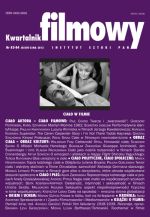O "Miłości" Michaela Hanekego trochę inaczej. Aporie cielesności
Michael Haneke's "Love" from another angle. Aporia of corporeality
Author(s): Sławomir SikoraSubject(s): Theatre, Dance, Performing Arts
Published by: Instytut Sztuki Polskiej Akademii Nauk
Keywords: Haneke Michael; corporeality
Summary/Abstract: It is not the first time that Michael Haneke challenges his audience. How are we to understand what the film shows and reveals? What is the meaning of the film’s story? The author of the article tries to pin point the performative nature of the film and the importance of corporeality in the presentation and telling of this story. He claims that the action (performance) is more important than words in the film, which is why this film can have a very strong impact on the viewer. The “performativity” of the film forces onto the viewer a different kind of reflection, one far exceeding easy expressed meaning. The director puts forward very strongly the issue of self determination, the possibility of deciding one’s own fate, even when it is no longer an easy matter to take that fate into one’s own hands. He presents a situation, a “place” where the individual loses out to the organised raison of “society”, which supports “life”. The article also raises the question of the adequacy of the film title. The author comes to the conclusion that Gabriel Marcel’s opinion that to love means to tell the other person: “you are never going to die”, paradoxically, is highly adequate in relation to this film.
Journal: Kwartalnik Filmowy
- Issue Year: 2013
- Issue No: 83-84
- Page Range: 152-162
- Page Count: 11
- Language: Polish

